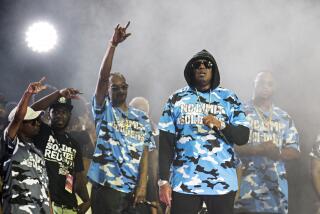In Court, Pog Is Not Just a Game : Marketing: Two groups are fighting over whether the name of the popular kids’ pastime is a trademark. The outcome could be worth millions of dollars.
SANTA ANA — A three-letter word for the latest schoolyard rage has landed at the center of a high-stakes legal battle that is being played out in an Orange County courtroom.
The word is pog . And the issue that will likely be settled during a jury trial this fall is who can legally market the name for the colorful, coin-sized discs that look like milk-bottle caps.
Universal Pogs Assn. Inc. is suing the World Pog Federation, disputing the federation’s claims of exclusive rights to the name. It’s a battle that the owner of Universal Pogs says he is prepared to fight all the way to the U.S. Supreme Court if necessary.
“It’s our position that the word pog is generic,” said Robert B. Rosenstein, an attorney representing Universal Pogs. “Everybody in the world uses the name pog.”
World Pog Federation attorneys, however, say the company holds the rights to the name and is seeking a court order barring Universal Pogs from using the P-word in its name and products.
“It’s the same claim made by people who have challenged the name Coke as being generic for soda, the same people who challenged Kleenex as being generic for tissue,” said Michael Eidel, an attorney representing the World Pog Federation. “Those are still trademark names.”
The legal dispute began last month and is being watched closely by other competitors in a fast-growing industry that some predict could generate $1 billion this year alone. Universal Pogs estimates about 10 million of the discs are produced a week in California by just a fraction of the manufacturers that have become involved with the game in the last two years.
“It’s going to be the Hula-Hoops of ’94 and ‘95,” said Jim Mitchell, president and chief executive officer of Garden Grove-based Safeco Plastics Inc. and SPI KAPS, which manufactures milk cap products. “It’s a fun game. I love watching the kids play.”
Mitchell is among those in the industry who believe pog should be used generically to describe the game, not “milk caps,” as World Pog Federation has argued.
He challenges anyone to go out with a stack of regular milk caps and ask children and adults alike what they are called.
“You will get the same response from everybody,” he said. “They are pogs.”
The game in the midst of the furor is simple and played much like marbles, but with silver-dollar-sized plastic and cardboard milk caps, similar to the flat circles once used to seal glass milk bottles.
Players hurl a heavier plastic disc known as a slammer or kini onto a stack of the cardboard caps. The trick is to flip the cardboard caps over by hitting them. Rules vary, with children playing for points or to keep the caps they successfully flip. Children also collect the discs, which are decorated with various logos, sayings, personalities and characters.
In recent months, the game has become so popular that some local schools have banned it during recess and other breaks, citing concerns of gambling and disruption. Others, however, praise the game, similar to ones played with old-fashioned milk caps dating back to the 1920s, for encouraging social interaction and teaching sportsmanship.
As the legend of the game’s revival goes, a teacher at an Oahu elementary school rounded up milk covers from a Hawaiian dairy several years ago and introduced the game to her students. The disc of choice among the children was a cap for a drink of passion fruit, orange and guava, otherwise known as POG. Hence the name.
Alan Rypinski, president and chief executive officer of World Pog Federation, said he competed against others and in September, 1993, obtained all rights to the POG brand name from the Haleakala Dairy for the game, as well as the fruit drink.
“When a company makes a very big success and pays attention, as we have paid as a corporation, to launching this brand and this wonderful kids’ game for the world, there are always a number of (people) who want to tag along,” Rypinski said.
His company sends hundreds of letters each week warning retailers and others that they can’t use the name pog unless they are selling trademark products from World Pog Federation.
“We are interested in protecting our rights to the fullest extent,” Rypinski said.
But Joe Kaufenberg, president of Universal Pogs, said others were using the name pog for their products long before World Pog Federation arrived on the scene. He disputes Rypinski’s claims to exclusive name rights and says such claims restrict trade and give World Pog Federation an unfair business advantage.
“The dairy sells juice, they don’t sell pogs,” Kaufenberg said. “And even if they had a trademark on their juice, that doesn’t give them the rights to the paper pogs or the slammers.”
Kaufenberg, whose company manufactures caps and slammers, said many retailers shy away from using other milk cap brands because they want to display the recognizable name of pog.
“If the retailers would know it’s a generic name, it would be fair game for everybody to go out there and sell their pogs,” he said. “It’s a new hobby for the kids that they really enjoy. It’s a cheap hobby for them to get into. It keeps the kids off the streets. They spend hours playing.”
For now, Orange County Superior Court Commissioner Jane D. Myers is considering motions from both sides on how to handle use of the word until the trial begins in November. Rosenstein, Kaufenberg’s attorney, said the company is also taking federal action to dispute World Pog Federation’s trademark application.
Kaufenberg said he’ll take the case to the U.S. Supreme Court if he has to, adding: “There’s just too many people in this country using pog. “
More to Read
Inside the business of entertainment
The Wide Shot brings you news, analysis and insights on everything from streaming wars to production — and what it all means for the future.
You may occasionally receive promotional content from the Los Angeles Times.










